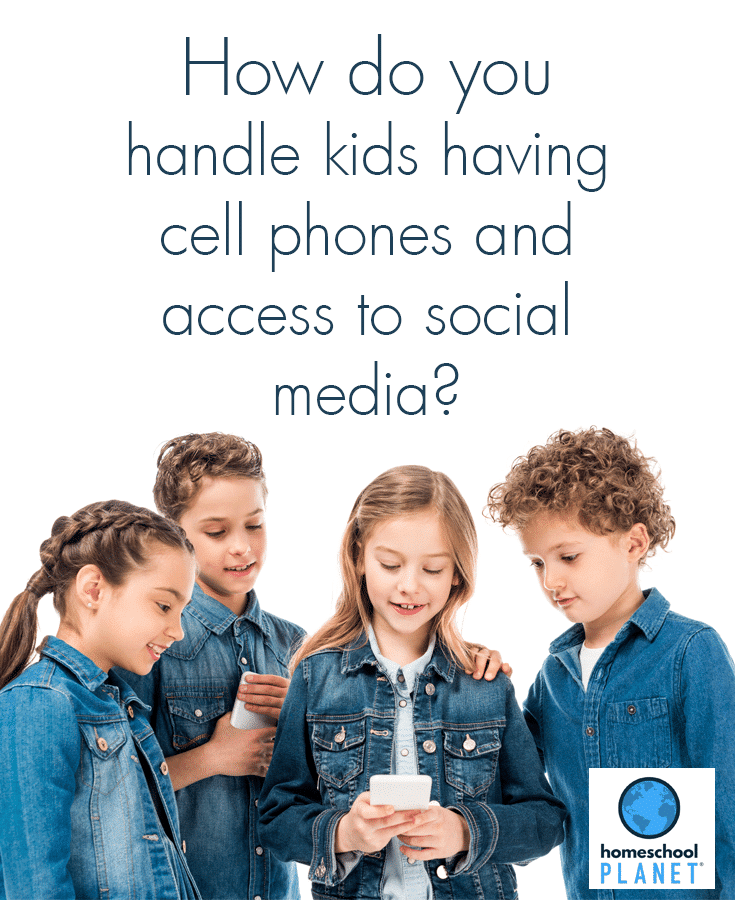How do you handle kids having cell phones and access to social media?
Aurora from Supercharged Science and her husband run a publishing company that creates hands-on science curriculum for K-12 homeschoolers. Read this helpful article as she discusses a questions she gets often from parents worried about their kids on media devices.

First, would you let young kids run loose in a wood shop or machine shop? You know, the kind with table saws, circular saws, power drills, air compressors, welding machines… all sorts of things that they could really get hurt with?
Of course not.
Or loose in the kitchen with open flames on the stove, sharp knives, and cleaning chemicals that create toxic gases if they’re not handled right?
Again… of course not.
The things you find in the wood shop, machine shop and the kitchen are tools, and people that work in these environments have been trained in how to use them. You wouldn’t give your toddler a butcher knife or keys to the car. The cost of learning is way too high.
Social media is like that. It’s like handing your car keys and letting them learn how to handle it on their own. Technology like iPads, cell phones, laptops and computers are tools that adults use to get a job done. If you’re going to build a table, you need access to your wood shop. If you’re going to write a report, you need a computer.
One of the biggest challenges is that most adults simply hand their kids a phone and hope it works out. Or they place blocks on it that kids see as a challenge to break. Either way, kids do not yet have the ability to wield their tools responsibly.
Your job as a parent is to guide your kids, teaching them what they need to know to make it out there in the real world. Kids that have been overly-sheltered and not exposed to media at all also don’t know how to handle it when they make their way into the world. Kids need the right education in order to make good choices about how what they focus on and they spend their time.
I have yet to hear a parent say “I wish my kid spent MORE time on their social media!” Every minute they spend on it is one less minute they have for something else, like learning a new skill or working on a project, or spending it with a friend…Or with the family.
For comparison, Olympic winners train every day for years before making an Olympic team, and they plan out their training schedules years in advance so they can hit specific goals.
Homeschooling is not quite the Olympics (although I am sure it feels like that some days!), but the approach is very similar to that of an Olympic athlete. You’ve got a goal, say get into a good college and be prepared for life, and you start homeschooling in say 4th grade, and you have 8 years to reach that goal.
Here’s the challenge – most kids major in minor things.
What do I mean by that?
The average kid spends 9.5 hours per day on a screen, including phones, computers, laptops, iPads… you name it. Most of the time it’s on non-educational things, like watching movies, playing video games, or on social media.
That’s a LOT of time.
It’s not what they’re doing when they are hooked to the screen, it’s what they are NOT doing.
For every hour they spend on technology, they’re not spending it doing the things that will develop their cognitive skills, like critical thinking, decision making, and developing relationships.
Consider this – most Olympic athletes train about 10,000 hours at a sport before making it to an Olympic team. Over the course of 8-10 years, that’s about 3-3.5 hours a day.
That’s it. Just 3 hours a day to be a world-class top expert in your field.
And kids spend over three times this amount doing… what?
Nothing.
It’s really kind of sad.
I know that the answer isn’t to get rid of the cell phone, because it’s not the phone or even technology that is making the trouble.
Technology is only magnifying what is already there.

I encourage you to look at your kids and see if you can figure out what they’re really after when they pick up their phone, turn on their computer, log in and sign out of life for the next couple of hours.
And when they do sign in, make SURE it’s something that will move them forward with their progress, enhance their educational experience, and not make them dependent on it.
My company, Supercharged Science, uses technology as a tool to demonstrate to kids how to learn about science in the real world. Then they take what they’ve learned from perhaps watching a 10-minute video, and they spend the next hour doing a hands-on experiment or project based on it.
Life happens out there in the world, not hidden behind a screen.
The best compliments we get are the ones where they kids have taken in our positive, empowering messages and now have the confidence they need to move on and innovate greater things than we ever taught them.
Real learning comes from doing, not just passively watching something. Technology can be a tool, like watching a video on how to do a science experiment, but then you have to actually do it! For example, if your kids want to learn about light and magnification, they might watch a short video on how to build a laser microscope out of simple materials, and then they hit pause and get out their supplies and spend the next half hour experimenting. This is where the real learning comes from.
If this sounds like something you’re interested in trying out for yourself, I’ve put together a set of hands-on science experiments that include step-by-step videos in one packet of science lessons. It’s a free mini-curriculum with the laser microscope experiment I just mentioned experiment along with four others that you can do today with your kids using this hands-on approach.
Whatever you do, get your kids engaged in the real world!
To start, go here to download your free homeschool science lesson packet: www.SuperchargedScience.com/rockets
Your Kids Won’t Grow Their Minds Browsing Social Media. Supercharge Their Education with Supercharged Science!
>> CLICK HERE to learn more about Supercharged Science and how you can get access to both the Supercharged Science Curriculum and Lesson Plans in the Homeschool Planet Marketplace!


